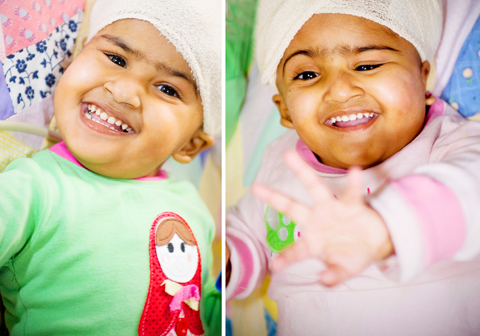A team of 16 surgeons and nurses successfully concluded 25 hours of delicate surgery yesterday to separate twin Bangladeshi girls who had been joined at their heads, sharing blood vessels and brain tissue.
It is too early to know whether the two-year-old girls, Trishna and Krishna, suffered any brain damage during the marathon operation — an outcome doctors said had a 50-50 chance.
The girls will remain in an induced coma for monitoring for several days after the completion of the surgery.

PHOTO: AFP
The medical team began the work on Monday morning on separating the girls, who were brought to Australia as infants by an aid organization.
“The teams managed to separate their brains and they are both very well,” Royal Children’s Hospital chief Leo Donnan told reporters.
“Now we have the long task of the reconstructive surgery, which will go on for many hours,” he said.
Plastic surgeons finished reconstructing the girls’ skulls using a combination of their own skin, bone grafts and artificial materials about five hours after the separation surgery ended.
“Their bodies have to recover from this and we’ve got a lot of unknown territory we’re moving into,” Donnan said. “All I can say is that everything is in place for the best possible outcome. The main thing is that the girls are healthy.”
Earlier yesterday, Ian McKenzie, a member of the surgical team, said the girls were improving as their bodies began to work individually.
“The twins are actually in better condition because the degree of separation has increased and this problem we’ve had with their circulation affecting each other has actually gotten less,” he said.
The girls shared parts of their skull, brain tissue and blood flow.
Before the surgery, doctors had said there was a 50 percent chance the girls could suffer brain damage and a 25 percent chance one of the sisters would die.
They were found in an orphanage in Bangladesh in 2007 by a representative from the Children First Foundation, who brought to them to Australia.

ECONOMIC WORRIES: The ruling PAP faces voters amid concerns that the city-state faces the possibility of a recession and job losses amid Washington’s tariffs Singapore yesterday finalized contestants for its general election on Saturday next week, with the ruling People’s Action Party (PAP) fielding 32 new candidates in the biggest refresh of the party that has ruled the city-state since independence in 1965. The move follows a pledge by Singaporean Prime Minister Lawrence Wong (黃循財), who took office last year and assumed the PAP leadership, to “bring in new blood, new ideas and new energy” to steer the country of 6 million people. His latest shake-up beats that of predecessors Lee Hsien Loong (李顯龍) and Goh Chok Tong (吳作棟), who replaced 24 and 11 politicians respectively

Archeologists in Peru on Thursday said they found the 5,000-year-old remains of a noblewoman at the sacred city of Caral, revealing the important role played by women in the oldest center of civilization in the Americas. “What has been discovered corresponds to a woman who apparently had elevated status, an elite woman,” archeologist David Palomino said. The mummy was found in Aspero, a sacred site within the city of Caral that was a garbage dump for more than 30 years until becoming an archeological site in the 1990s. Palomino said the carefully preserved remains, dating to 3,000BC, contained skin, part of the

Russian hackers last year targeted a Dutch public facility in the first such an attack on the lowlands country’s infrastructure, its military intelligence services said on Monday. The Netherlands remained an “interesting target country” for Moscow due to its ongoing support for Ukraine, its Hague-based international organizations, high-tech industries and harbors such as Rotterdam, the Dutch Military Intelligence and Security Service (MIVD) said in its yearly report. Last year, the MIVD “saw a Russian hacker group carry out a cyberattack against the digital control system of a public facility in the Netherlands,” MIVD Director Vice Admiral Peter Reesink said in the 52-page

‘WATER WARFARE’: A Pakistani official called India’s suspension of a 65-year-old treaty on the sharing of waters from the Indus River ‘a cowardly, illegal move’ Pakistan yesterday canceled visas for Indian nationals, closed its airspace for all Indian-owned or operated airlines, and suspended all trade with India, including to and from any third country. The retaliatory measures follow India’s decision to suspend visas for Pakistani nationals in the aftermath of a deadly attack by shooters in Kashmir that killed 26 people, mostly tourists. The rare attack on civilians shocked and outraged India and prompted calls for action against their country’s archenemy, Pakistan. New Delhi did not publicly produce evidence connecting the attack to its neighbor, but said it had “cross-border” links to Pakistan. Pakistan denied any connection to